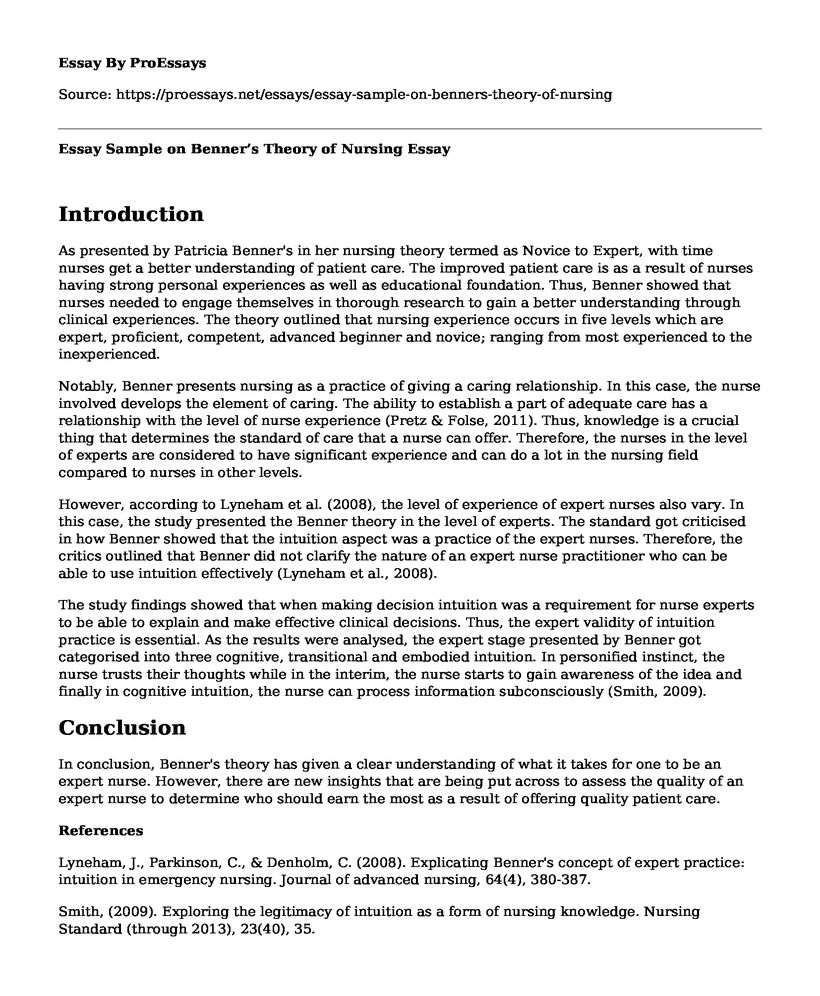Introduction
As presented by Patricia Benner's in her nursing theory termed as Novice to Expert, with time nurses get a better understanding of patient care. The improved patient care is as a result of nurses having strong personal experiences as well as educational foundation. Thus, Benner showed that nurses needed to engage themselves in thorough research to gain a better understanding through clinical experiences. The theory outlined that nursing experience occurs in five levels which are expert, proficient, competent, advanced beginner and novice; ranging from most experienced to the inexperienced.
Notably, Benner presents nursing as a practice of giving a caring relationship. In this case, the nurse involved develops the element of caring. The ability to establish a part of adequate care has a relationship with the level of nurse experience (Pretz & Folse, 2011). Thus, knowledge is a crucial thing that determines the standard of care that a nurse can offer. Therefore, the nurses in the level of experts are considered to have significant experience and can do a lot in the nursing field compared to nurses in other levels.
However, according to Lyneham et al. (2008), the level of experience of expert nurses also vary. In this case, the study presented the Benner theory in the level of experts. The standard got criticised in how Benner showed that the intuition aspect was a practice of the expert nurses. Therefore, the critics outlined that Benner did not clarify the nature of an expert nurse practitioner who can be able to use intuition effectively (Lyneham et al., 2008).
The study findings showed that when making decision intuition was a requirement for nurse experts to be able to explain and make effective clinical decisions. Thus, the expert validity of intuition practice is essential. As the results were analysed, the expert stage presented by Benner got categorised into three cognitive, transitional and embodied intuition. In personified instinct, the nurse trusts their thoughts while in the interim, the nurse starts to gain awareness of the idea and finally in cognitive intuition, the nurse can process information subconsciously (Smith, 2009).
Conclusion
In conclusion, Benner's theory has given a clear understanding of what it takes for one to be an expert nurse. However, there are new insights that are being put across to assess the quality of an expert nurse to determine who should earn the most as a result of offering quality patient care.
References
Lyneham, J., Parkinson, C., & Denholm, C. (2008). Explicating Benner's concept of expert practice: intuition in emergency nursing. Journal of advanced nursing, 64(4), 380-387.
Smith, (2009). Exploring the legitimacy of intuition as a form of nursing knowledge. Nursing Standard (through 2013), 23(40), 35.
Pretz, J. E., & Folse, V. N. (2011). Nursing experience and preference for intuition in decision making. Journal of clinical nursing, 20(1920), 2878-2889.
Cite this page
Essay Sample on Benner's Theory of Nursing. (2022, Nov 25). Retrieved from https://proessays.net/essays/essay-sample-on-benners-theory-of-nursing
If you are the original author of this essay and no longer wish to have it published on the ProEssays website, please click below to request its removal:
- Analysis of a Health Campaign Message for Tuberculosis
- Research Proposal Example: Impact of Medical Procedure Prices on Society
- Paper Example on Infectious Diseases
- Paper Example on Organ Transplantation
- Nursing and Matters of Spirituality and Meaning of Life Paper Example
- Paper Example on Health Disparities in the United States
- Social Media and HIPAA Paper Example







